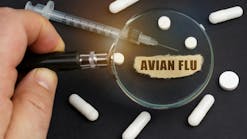MLO “Observing 40 Years”
As someone who became a medical technologist (ASCP) in 1958, I have watched and been part of the medical technology field for 51 years. Patricia Ingram's poem really “struck a chord” — so many things (“tests”) have changed but some have stayed the same. In some cases, the procedure (method) was automated; in other cases, a new procedure was developed. It will be interesting to see what the next 40 years will bring.
—J. P. Kilbourn, BS, MS, PhD, MT(ASCP)
Patricia Gail Ingram's reply: Thank you for reading the commemorative poem! I was hoping to strike some chords with those of us who have padded the field of laboratory medicine with our experience and dedication these past 40 years.
When Carren asked if I would like to help MLO celebrate its 40th, it suddenly dawned on me it was, indeed, my 40th year career anniversary, too. It was fun reminiscing over all the changes.
You know, there are a few tests that have not changed … Acetest, Ictotest, spun hematocrits (if you even do them anymore — we do not), a few tube and slide typing tests in blood bank, perhaps a few of the species differentiating tests in micro, Wright's stain, Gram's stain …. Well, you will have to name others as I only feel secure on the first three!
What has changed about them? Regulations, QC, and competency requirements! Yes, the next 40 will be most ethereal. I plan to be writing poems in heaven!
Five-star compliment
I read with great interest the article in April's issue of MLO pertaining to creating a five-star courier service. This is a subject rarely written about (or discussed at national industry meetings), but it remains crucial for laboratories to embrace a “five-star” mentality if they expect to build a great reputation. Authors Gile and Ogden-Grable offer a number of valuable tips for labs to institute to design a superior service concept. I would, however, suggest going one step further.
Various departments within each lab — especially the logistics area — should implement a “service strategy.” The manager (with input from others) should write down an understandable and unifying idea of what the department is trying to accomplish to make itself unique in the eyes of the clients.
This concept of service strategy directs the attention of people within the department toward the real priorities of the client. It focuses on a well-chosen benefit premise that demonstrates value to the client and establishes an effective competitive position. In essence, it says, “This is who we are, what we do, and what we believe in.”
Hats off to Gile and Ogden-Grable for bringing to light an important, but often overlooked, component of a clinical lab's overall service.
—Peter Francis
President
Clinical Laboratory Sales Training, LLC
Gile and Ogden-Grable's reply: We would like to thank Mr. Francis for his kudos, and we agree that a “five-star” courier service is just the tip of the iceberg. A service strategy is an integral part of making any laboratory function as a team putting the customer first, regardless of who that customer might be — colleague, client, or patient. We hope that managers will consider Mr. Francis' suggestions as they develop their internal mission, vision, and value to their customers.
“Old” techs want new “tricks”
At the risk of sounding old, outdated and just plain out-of-touch, I was reading your article “What goes around, comes around: A review of circulating tumor cells” from the April 2010 MLO, and it got me wondering. I have been a practicing medical technologist for nearly 30 years, and a lot has changed in that time.
With DNA analysis, FISH testing, microarrays, and now CTCs, among other technologies, exactly who is doing the testing? What kind of background do these people have? Are there any medical technologists? How do you find out about these jobs? What do they pay? They seem enormously interesting and challenging as well as making a huge contribution to patient care and outcome. Do medical technology students get introduced to this new technology, even in theory? Is the shrinking pool of medical technologists at least fractionally due to the explosion of this technology and need for highly skilled workers?
It seems to me that this type of technology would be a marriage made in heaven for experienced medical technologists looking for more of the same, so to speak. Being mechanically inclined as is the nature of our careers, this technology would seem to lend itself to an experienced tech looking to branch in to something else but staying true to the field. So, are there medical technologists running these sophisticated analyzers?
—Alison Ide-Smith, MBA, MT(ASCP)
Laboratory Manager
Connecticut Oncoloy and Hematology LLP
Torrington, CT
Need used equipment?
Our lab closed about a year ago. I stayed with the hospital network of which I was a part and, at this point, they have decided they would like to sell all or part of this lab equipment. I remember reading something in MLO about agencies or organizations that might purchase secondhand or used lab equipment. Could I have the names of any of these organizations with which you may be familiar?
—Mark Adelman
Director of Lab Services
Beth Abraham Health Services
Editor's note: If you are a laboratory in need of secondhand or used lab equipment, please contact me at [email protected] so that you may be put in contact with Mr. Adelman. You might also refer to Dr. Amadeo J. Pesce and Ed Tirakis' article on purchasing used equipment in the April 2010 issue of MLO on pages 68-69.
Q&A columns answer my questions
I had to write to say how much I enjoy MLO. As manager of a large POL, I find MLO informative and educational. I especially like the Q&A sections. I have found myself asking many of the same questions. I use a lot of the articles as part of continuing education for our staff. Each month, as soon as I finish reading my copy of MLO, I anxiously await the next issue. MLO is the best laboratory magazine I have ever read.
—Nancy Beaupre, MLT(ASCP)
Assistant Manager
Acton Medical Associates
Acton, MA
Editor's note: Management Q&A editor Anne Pontius, Tips editor Dr. Brad Karon, and Liability and the Lab editor Barbara Harty-Golder appreciate Ms. Beaupre's “thumbs-up” review of the Q&A columns they produce for MLO each month. These columns are often noted as the most popular features by MLO readers. We hope that the topics covered by questions sent in by readers and answered by our experts help other laboratorians do their jobs better. Readers should feel free to send in their own questions to our editors, because someone else probably has the same question!
MLO welcomes letters to the editor. We ask that you
include a phone number for verification. While we prefer to publish the writer's
name, we will publish a letter with “name withheld by request,” but our
editorial staff must have the writer's name confirmed for our files. MLO
reserves the right to edit any letter for style and length.





